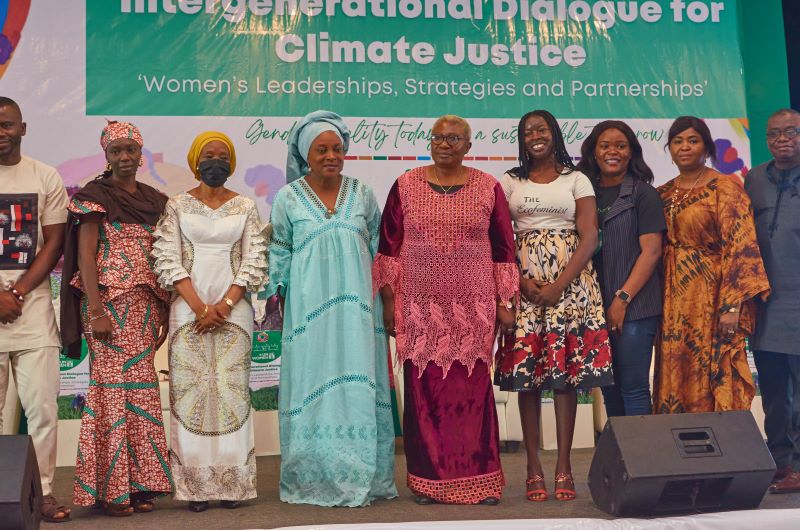NIGERIA : Youth climate activists call for inclusive, collective action, and the acclivity of marginalized voices in grassroots communities on issues of climate change
Date:

As part of the activities to commemorate International Women’s Month, UN Women hosted a discussion titled “Intergenerational Dialogue for Climate Justice: Women’s Leaderships, Strategies and Partnerships”.
The event was moderated by Eugenia Abu, Broadcaster and Journalist. Ms Abu was joined by a high-level panel of women leaders for an interactive and dynamic dialogue. The conversation showcased the efforts of Nigerian women’s resilience to issues of climate change, approaches towards mitigation and responses.
Speaking at the dialogue was the United Nations (UN) Resident and Humanitarian Coordinator in Nigeria, Mr Matthias Schmale in his address said the gender dynamic of climate change in Nigeria is still relatively poorly understood, unlike in other countries.
“Gender inequality coupled with the climate crisis is one of the greatest challenges of our time. In Nigeria as in other countries, the gender dynamics of climate change are still relatively poorly understood, and women are still generally lacking in climate-security policymaking and practice to date. Without gender equality today, a sustainable future, and an equal future remains beyond our reach”.
“Gender equality is an essential precondition for successful climate change adaptation and mitigation responses, and equitable social development. Women are increasingly being recognized as more vulnerable to climate change impacts than men, as they constitute the majority of the world's poor and are more dependent on the natural resources, which climate change threatens the most”.
Mr Schmale further added that despite the increasing number of evidence, there has been limited policy action and linkages between social equity and climate change.
“Programmatic and advocacy agenda has not effectively prioritized social outcomes, and more importantly, the differing impacts on vulnerable groups, especially women and girls. Therefore, forums such as these that promote intergenerational dialogue, remain instrumental in promoting women’s rights, sharing best practices for advancing gender equality, documenting the reality of women’s lives throughout the world, and shaping global standards on gender equality and empowerment of women”.
Speaking at the dialogue, UN Women's Country Representative to Nigeria, Ms Comfort Lamptey said climate justice is at the forefront of the United Nations global agenda, as this is one of the six pillars of the Global Acceleration Plan on Gender Equality.
“UN Women, together with feminists across the world, and the Governments of France and Mexico, celebrated the Generation Equality Forum in Mexico City and Paris in 2020”. The Generation Equality Forum is a set of six catalytic action coalitions to drive investment and produce tangible, irreversible results on gender equality during the UN Decade of Action (2020-2030) to deliver the Sustainable Development Goals”.
“Nigeria committed to the Action Coalitions to deliver concrete, game-changing results across generations for women and girls. Today, we have the privilege of engaging in this intergenerational dialogue on this critical issue and indeed, this is an issue that requires stakeholders of all generations”.
Climate activist Enogba Ende Dan in her message added that, tomorrow is indeed under a threat, due to the harsh realities of climate change on humanity.
“The global south has been impacted by this issue and it disproportionately affects women and girls, this has led to the loss of lives, degradation of properties in different areas of Nigeria, therefore, it is only fair for us to seek ways and strategies through which climate justice can be gotten”.
Contributing to the dialogue, Her Excellency, Toyin Saraki called for an inclusive approach to address climate change issues, as it is important that the younger generation works with experts and seasoned professionals on this topic, so experiences can be shared, efforts can be synergized, and solutions can be proffered.
Young women activists, Adenike Oladusu, Gloria Bulus, Rita Idehai answered compelling questions posed by the audience. After an exhaustive deliberation on this issue, these youth climate activists called for an inclusive and deliberate approach by the Nigerian Government and also the need to involve those at the grassroot level on the decision-making tables as they are directly impacted by issues of climate change.